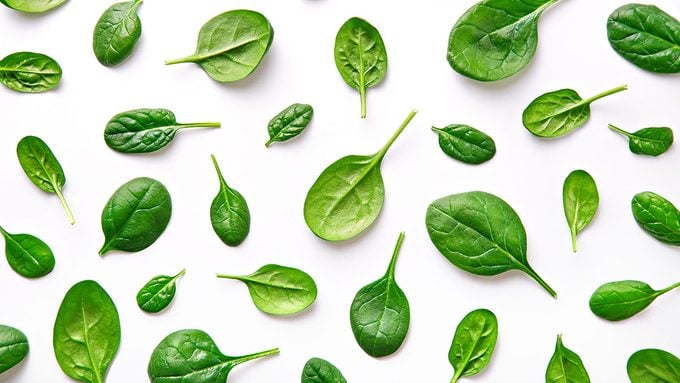The Scary Reason You Might Want to Switch to Organic Spinach
There’s something dirty hiding in those leaves.

This is why you might want to go organic with your spinach
If you’ve ever spent time debating whether organic produce is worth the price, you might be familiar with the Dirty Dozen list put out by the Environmental Working Group. The list highlights the 12 “dirtiest” fruits and vegetables with the most pesticides, and there was one VIP on the list. From 2016 to 2017, spinach jumped up six spots to become the second “dirtiest” produce you can buy, right behind strawberries.
Of the 708 non-organic spinach samples collected by the USDA in 2015, a whopping 96.6 percent had traces of at least one pesticide, and 13.6 percent contained at least 10. For comparison, only 81 percent of lettuce samples contained pesticides, and just 1.1 percent had traces of 10 or more, according to the USDA. (Find out which healthy foods are actually dangerous to overeat.)
Keep in mind, though, that the mere presence of a pesticide won’t necessarily lead to any negative health effects. The EWG expressed concern that about 71 percent of spinach samples contained some form of permethrin, a pesticide banned in the EU and is considered a “weak carcinogen” by the EPA. Still, the USDA does say low levels of permethrin in foods are safe, and none of the spinach samples exceeded that safe amount.
What could be more concerning is that some samples did exceed the legal limits of certain chemicals. Eight samples had levels higher than the EPA tolerates, and three samples contained three different pesticides that the EPA doesn’t allow at all. Of the 17 fruits and veggies tested, spinach’s numbers were topped only by strawberries, which had 24 samples with chemicals above the tolerated limits and one sample with four non-tolerated pesticides.
These results only came from conventionally grown spinach, so buying organic could cut down on the number of pesticides you’re exposed to. Organic farmers can still use pesticides, but they have to be natural rather than synthetic chemicals. (These are the foods you should always buy organic.)
If you’re debating which groceries are worth the higher price for organic, spinach should be one of the first ones you buy organic, says Libby Mills, MS, RDN, LDN, FAND, spokesperson for the Academy of Nutrition and Dietetics. The pesticides come directly into contact with the leaves you eat, which could be one reason it ranks so high on the Dirty Dozen, she says. On the other hand, there’s probably no need to shell out for organics with fruits with a natural barrier you peel away, like bananas and avocados, Mills adds.
Regardless of whether you pick organic or conventional spinach, rinse them when you get home. Try submerging the leaves fully in a bowl of cold water, then rinse with a colander and repeat, says Mills. “Washing your fruits and vegetables is a simple way to remove a large percentage of things that might be left on the surface,” she says.
This is why women might want to avoid pesticides before getting pregnant.




